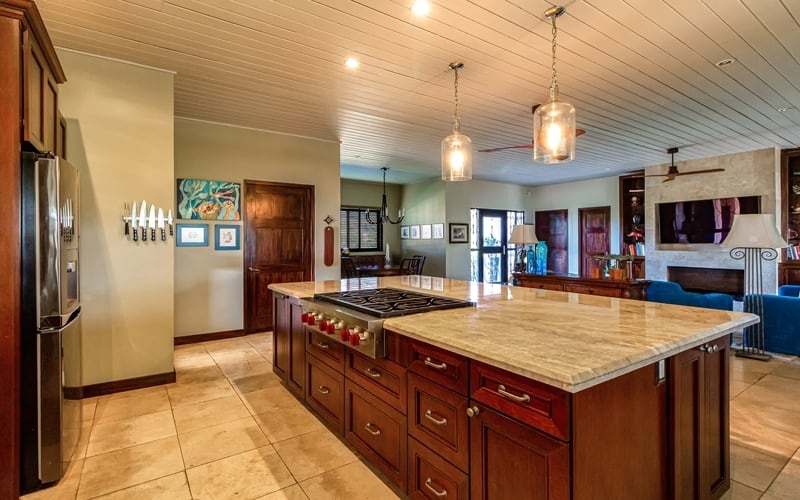If you’re in the market for a new home, or casting your eyes over your property-related paperwork, you might have come across the term ‘freehold title’. Or, perhaps, you’re perplexed why, instead of a freehold title, your dream property has a strata, leasehold, or Torrens title.
Titles are tools used by governments to record and keep track of land ownership in Australia and many other parts of the world.
What kind of title a homeowner has might depend on the type of property they own, where they’ve bought it, and its overarching purpose.
What is a freehold title?
If you own a house down under, you most likely boast a freehold title. That means you're the owner in all legal senses and can sell, lease, or pass your home down as an asset for generations to come, if you wish to. You’re also able to own it for as long as you wish, unlike owners of properties with certain other titles.
However, holding a freehold title doesn’t mean a homeowner can do whatever they wish to their property without permission. If you’re planning to build a permanent shed, put in a pool, or add a few extra bedrooms, for instance, you might need to seek permission from your local council.
Freehold titles are sometimes referred to as Torrens titles, after Sir Robert Richard Torrens. Mr Torrens is widely credited with creating the title system in South Australia in the mid-1800s.
What is the difference between freehold, strata, or leasehold titles?
There are quite a few different titles available to property in Australia. The most common is a freehold title.
But if you’re not purchasing or in possession of a whole, ground-dwelling property – say, you’re buying a unit or apartment – you’ll probably be receiving a strata title.
That means you only own your apartment or unit – not any elevators or hallways, communal areas, or even shared walls. Often, owning a property with a strata title will see you paying regular (and sometimes sporadic) fees to fund the maintenance of communal areas and infrastructure.
Finally, a leasehold title is much like the name suggests. It's a type of title that you might only be able to own for a set amount of time. Typically, around a century. While leasehold titles were more common historically than they are in contemporary times, leaseholds are abundant in one particular place: the ACT.
Lender Home Loan Interest Rate Comparison Rate* Monthly Repayment Repayment type Rate Type Offset Redraw Ongoing Fees Upfront Fees Max LVR Lump Sum Repayment Extra Repayments Split Loan Option Tags Features Link Compare Promoted Product Disclosure
Promoted
Disclosure
Promoted
Disclosure
Promoted
Disclosure
Disclosure
The ACT complex
The ACT is alone in being an Australian state or territory that offers only leasehold titles to landowners. Anyone who buys a property in the state is buying it under a 99-year lease term.
In practice, there doesn’t appear to be any major differences between owning a leasehold title in Canberra or a freehold title anywhere else when it comes to the joys and challenges of property ownership.
Though, as unlikely as it is that the government would seize a property at the end of a lease period, it's still possible. The territory promises that, unless it particularly needs the land, it will simply grant a new 99-year lease to any properties with titles approaching their expiry date. Canberrans can also apply to have their 99-year lease renewed whenever they wish in exchange for an administrative fee.
Still, buying a leasehold title might make some buyers nervous.
The reason for the leasehold situation in the ACT dates back close to 99 years itself. It was originally established as a way for the territory government to capitalise on capital gains. In the 1920s, the ACT government asked landowners to pay ‘land rent’ on their property at an amount relative to its valuation, which was updated every few decades. While the territory essentially binned land rent in 1971, leaseholds remain.
Title deeds
If you’re not sure what kind of title is on your property, where your title deed is, or how to access your deed, you can check with your relevant state or territory department:
-
NSW Land Registry Services
-
LANDATA (Victoria)
-
Titles Queensland
-
Land Services SA
-
Landgate (WA)
-
The List (Land Information System Tasmania)
-
ACTLIS (Australian Capital Territory Land Information System)
-
Northern Territory Title Search
Bear in mind, if you have a mortgage on your house, your lender might be charged with holding the title deed to your property.
Can you be forced to sell a freehold title?
Unfortunately, there are situations in which a homeowner can be forced to give up their property.
The government (local, state, or federal) can snatch up your property if it needs it. And it might. As time passes and towns and cities grow, those who live there might need more schools, hospitals, or carriageways – and people's homes are often in the paths of new infrastructure.
The process a government needs to undergo to take control of a freehold title is called compulsory acquisition. It was arguably made famous by the 1997 Aussie classic The Castle. While you might not have much say in the matter if the government comes knocking, it does have to acquire your property on fair terms, as those who love the movie will know.
Source: Working Dog Productions
Ownership titles of apartments or units
Unlike in some parts of the world, like the United Kingdom, most Australian apartments offer strata titles rather than leasehold titles. That means an owner can keep their property for as long as they like.
However, it's worth noting that many apartment complexes are governed by an owners corporation and, thus, individual owners don’t always have total control over their property. In most states, if an owners corporation votes to sell the complex to, say, a developer who plans to demolish it, they need the permission of all owners. But in some states, like NSW, just 75% of owners need to agree on a sale for it to go ahead.
Thus, there might not be much an owner can do to keep their property in such situations. Though, most owners in that position could count on receiving compensation.
Ownership in retirement villages
Property ownership can be particularly complicated for those hoping to buy in a retirement village. There are various ways a person can ‘purchase’ property in a retirement village, and anyone considering doing so will likely find value in independent legal advice.
Some common ownership structures of retirement villages include:
-
A title of strata, with additional restrictions on selling and using the property
-
A community title – the property title is held by many people, similar to a strata title
-
A company title – an ‘owner’ buys into the company that owns their home. In return they’re allowed to live in the building
However, the vast majority of Australia’s modern retirement villages offer lease agreements, sometimes with an upfront and outgoing payment attached, according to SimplyRetirement.
Savings.com.au’s two cents
Knowing the type of title attached to a property you’ve bought or are interested in buying is important as it determines the level of ownership and control you have over your asset.
The title your property carries can be dependent on what kind of property you buy, where it's located, and even the purpose it was created for.
If you’re unsure of your home’s title or the title on a property you’re looking to buy, or have any other concerns over your ownership of a real estate asset, it might be worth obtaining independent legal advice.
Image by Amy Shamblen on Unsplash

Ready, Set, Buy!
Learn everything you need to know about buying property – from choosing the right property and home loan, to the purchasing process, tips to save money and more!
With bonus Q&A sheet and Crossword!







 Harry O'Sullivan
Harry O'Sullivan

 Denise Raward
Denise Raward
 William Jolly
William Jolly
 Brooke Cooper
Brooke Cooper

